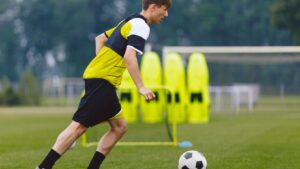Youth soccer training is more than just drills and practice games; it’s a dynamic journey that shapes young athletes both on and off the field. As the world’s most popular sport, soccer offers children an opportunity to develop essential skills like teamwork, discipline, and perseverance. With the right training approach, young players can unlock their full potential and foster a lifelong love for the game.
In today’s fast-paced world, youth soccer training has evolved to include innovative techniques that cater to the diverse needs of young athletes. Coaches and parents play pivotal roles in creating an environment that balances skill development with fun and enjoyment. By focusing on age-appropriate exercises and fostering a positive atmosphere, they can help nurture confident and capable players.
Youth Soccer Training

Youth soccer training provides more than just physical activity. It’s a foundation for growth in vital areas of life. Players learn teamwork, crucial in collaborative settings. Understanding team dynamics helps in personal and professional relationships.
Discipline develops through consistent practice and adherence to rules. This discipline extends beyond soccer into academics and personal commitments. Perseverance is another key aspect. Young athletes face challenges, and overcoming them builds resilience.
Popular Training Drills For Youth
Youth soccer flourishes when players engage in well-structured training drills. These drills enhance technical and tactical skills essential for player development.
Passing And Dribbling Drills
Developing passing and dribbling skills lays a foundation for advanced play. Coaches often implement basic passing drills like the “Triangle Pass” where players pass the ball between three cones in a triangle formation, improving accuracy and speed. “Dribble Relay” is another effective drill. It encourages quick footwork and control as players maneuver through cones in a timed sequence. These activities boost coordination and pressure-handling abilities.
Shooting And Scoring Drills
Shooting and scoring require precision and composure. “Target Shooting” aids accuracy by challenging players to aim for designated targets within the goal. It progressively increases target difficulty. The “1v1 Finishing” drill involves a shooter facing a goalkeeper, honing decision-making and shot techniques. These drills build confidence and quick thinking in goal-scoring scenarios.
Defensive Drills
Strong defensive skills prevent opponents from scoring. “Shadow Defending” helps players practice marking and anticipating opponents’ movements by mirroring their actions without the ball. “Pressure Cover Balance” teaches defensive positioning, highlighting the importance of maintaining a supportive structure while applying pressure. These drills emphasize tactical awareness and physical resilience.
Role Of Coaches In Youth Soccer Training

Coaches in youth soccer training guide player development, shaping both their skills and mindset. Coaches design structured training sessions, incorporating drills tailored to enhance technical abilities like dribbling and passing. By understanding individual player’s strengths and weaknesses, they provide personalized feedback, promoting continuous improvement.
Communication stands central to a coach’s role. They articulate strategies and ensure players comprehend tactical components, enabling informed decision-making during matches. By fostering open dialogue, they create an environment that encourages questions and supports learning.
Motivation plays a crucial role in player engagement. Coaches inspire by setting achievable goals and celebrating milestones, reinforcing dedication. Through positive reinforcement, they instill confidence, keeping players motivated to advance in their soccer journey.
Benefits Of Early Soccer Involvement

Engaging in soccer from a young age provides numerous developmental advantages. Young players often experience enhanced physical fitness, as soccer promotes cardiovascular health, coordination, and flexibility through consistent movement and exercise.
Participating in team sports like soccer fosters essential social skills. Kids learn effective communication and cooperation as they navigate shared goals and responsibilities within a team setting. This collaborative learning environment helps build confidence and interpersonal skills.
Early soccer involvement encourages cognitive development. Understanding game strategies and anticipating opponents’ moves require quick thinking and problem-solving, which enhance cognitive agility.
Emotional well-being also benefits from early soccer participation. The sense of achievement from skill improvement and game successes boosts self-esteem, while coping with losses promotes resilience and emotional maturity.



